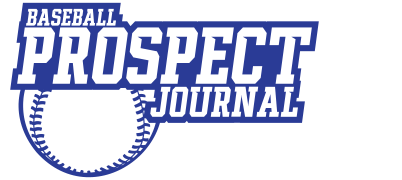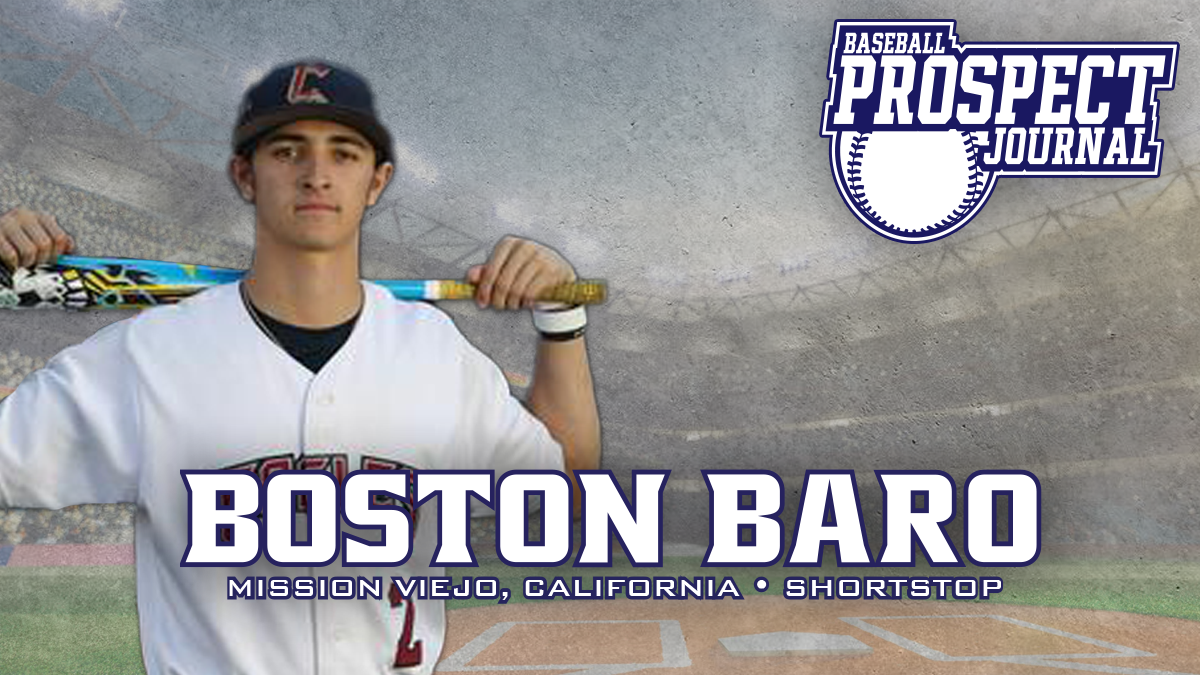When you are born with the name Boston Baro, chances are that sports become a prominent aspect of your life from an early age. Baro’s father, originally a New England native and ardent fan of the local Boston area teams, chose to name his son after the city and maintain a connection to his family roots after moving to Northern California.
“My dad’s side of the family are Boston natives and grew up huge Celtics, Red Sox, and Patriots fans,” Baro said. “The thought process was if my dad had a son, he would name him Boston. That is how my name came out to be and I got into baseball at an early age as a result.”
Baro developed a passion for baseball by honing his skills with a summer league called Trombly Baseball in Orange County, California. The travel league helps promising young ballplayers prepare for their future careers and provides the resources to reach their full potential. Playing in a competitive league with a winning culture helped Baro transition to the high school diamond and understand the steps needed to attain his objective.
“Playing on a travel team helped prepare me mentally, and I learned how to play the game, such as on defense, and developed an approach that I could use going to high school,” Baro said. “Trombly got me ready for high school baseball and honestly for life in general. I feel like it is important to play travel ball to prepare for competition against other players from different parts of the country and it gives you the exposure to the types of players you might face in high school or college.”
Four years at Capistrano Valley High School followed as Baro blossomed as one of the state’s top prep shortstop prospects, hitting a robust .463 in 95 at-bats in his junior season. Future plans appeared secure with a commitment to UCLA but his breakout year led to increased attention from scouts and draft analysts, who envisioned Baro turning pro out of high school if the right opportunity arose. The New York Mets selected Baro in the eighth round of the 2023 MLB draft and signed him to an above-slot deal.
“Going pro out of high school was a dream,” he said. “I knew I was ready mentally and from a baseball standpoint. My junior season helped put my name on the map in terms of the draft, and I was still playing for Trombly as well. I played in a tournament in Louisiana, and it put my name out there for a lot of colleges and scouts.”
A personal highlight for Baro after signing with the Mets out of the draft was a trip to Citi Field, where he attended a game with fellow prospects Brandon Sproat and Colin Houck and took batting practice with the club. Baro also met with the local media for the first time, getting a glimpse of the major league environment and culture. The overall experience became one of Baro’s most cherished memories and helped him become acclimated to pro ball before officially making his on-field debut.
“It was an awesome memory (to visit Citi Field),” Baro said. “I was also able to get to know Colin well and later played with him in Class A at St. Lucie. Getting to know the guys and seeing what New York was like and the vibe at the ballpark was a once-in-a-lifetime opportunity. It made me feel more comfortable going into pro ball knowing that the Mets organization felt highly of me and helped me relax once I had the chance to play in actual games.”
Strength training was an essential focus of Baro’s preparation heading into the 2024 season, facing more advanced competition. Adding mass to a 6-foot, 170-pound frame would also help the young infield prospect improve his durability and line drive rates. Baro opened the year in Class A St. Lucie and displayed consistency at the plate with a sound approach, hitting .288 with a .368 on-base percentage. His hitting prowess endured into the summer months, and he became one of the leading hitters in the Florida State League.
“I put on about 30 pounds in the offseason to prepare for playing in my first full season in pro ball,” he said. “Those added pounds definitely helped me stay healthy and sustain my performance over the entire year. Getting stronger was a main focus for me and will be for a while because of the results I had at St. Lucie. Strength training helps you in several areas playing the game, such as speed, hitting the ball harder, which will result in more power over time, and just your body being able to over 100-plus games a year.”
Sustained success at the plate is a product of Baro’s line-drive-oriented approach that allows him to maintain a fluid swing in the box and pull the ball into the gaps. He also has a thorough understanding of the strike zone and is not averse to taking his share of walks when he does not get a hittable pitch against an opposing pitcher. His offensive profile resembles a prototypical second-place hitter who can hit behind the leadoff man and set up the middle of the batting order.
“The strike zone is an area where I feel comfortable with my approach,” Baro said. “I like to pull the ball early in the count, but once I get to two strikes, I’m looking to hit the ball all over the field and try to get on base by any means. Swinging earlier in the count is something I’ll look to work on moving forward and being more aggressive at the plate.The idea is to narrow down my strike zone and put the bat on the ball.”
In recent years, the Mets have made a concerted effort to draft or acquire infield prospects who can play multiple positions on the diamond. Baro fits the approach, splitting time between shortstop, third base, and second base since turning pro. His natural position in high school was shortstop where he displayed soft hands with a quick and accurate release. Baro has better-than-average arm strength and range to play three infield positions and maintain his versatility.
“Having good arm strength allows you to play anywhere on the diamond and adds to your versatility,” he said. “You try to just be on that field every day and be ready when you see your name in the lineup at any position. I played all three positions (shortstop, second base, and third base) in high school and travel ball, so I felt prepared for pro ball, which was beneficial because I could contribute wherever they put me and keep my bat in the lineup.”
Baro’s 2024 season concludes with a promotion to Class A-Advanced Brooklyn, where he will play two series with the club and familiarize himself with the level of play heading into the offseason. Late-season promotions at the minor league level give players a general idea of future expectations and goals while preparing them to open the club with the same club next year. Baro looks ahead to new challenges in Brooklyn and believes his late-season cameo in Class A-Advanced can help him build towards his future in the Mets system.
“I was excited to play in Brooklyn from the moment I walked on the field for my first home game with the backdrop and the fans here,” Baro said. “One of my goals during the season was to finish the year in High-A. It helps me prepare to go into the offseason to get an idea of the pitching compared to Low-A and know what areas to work on to improve in preparation for next season in Brooklyn.”


